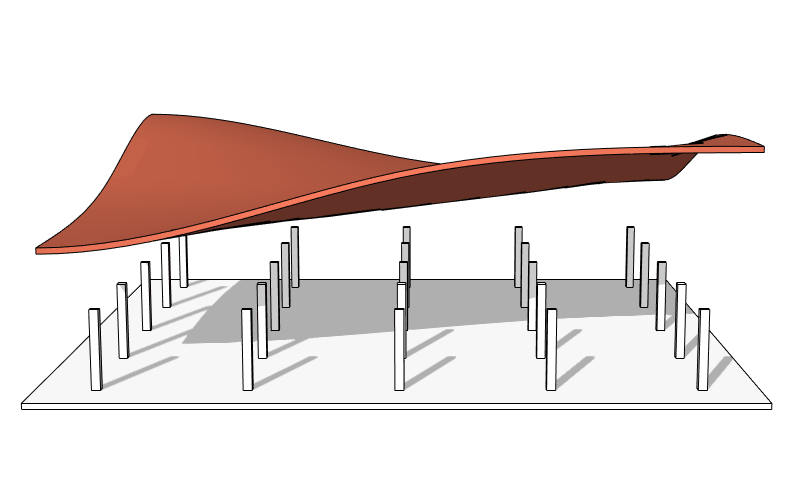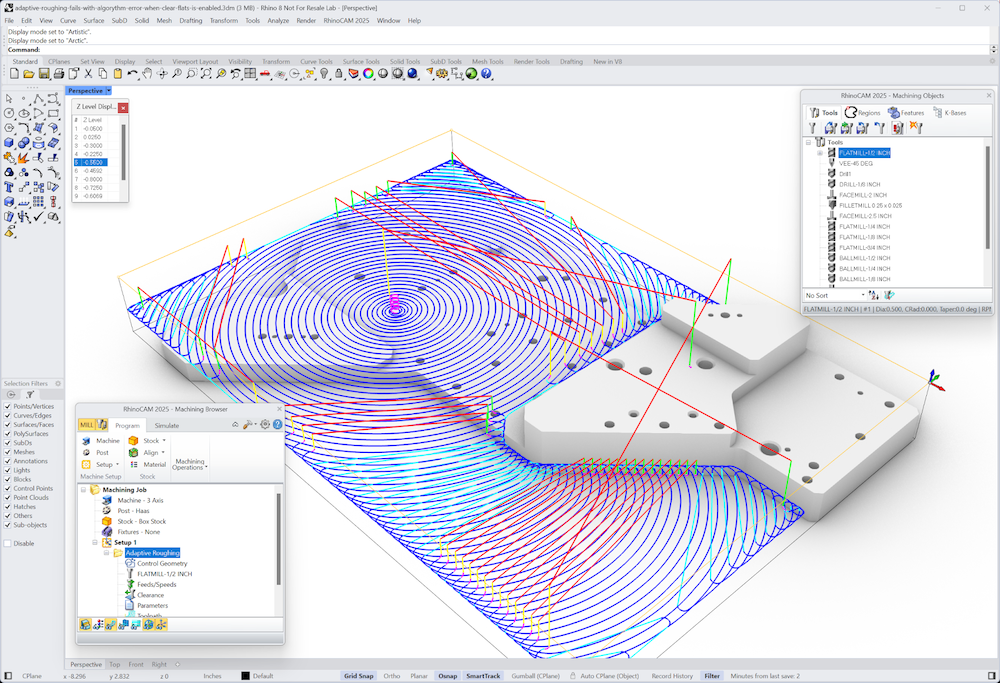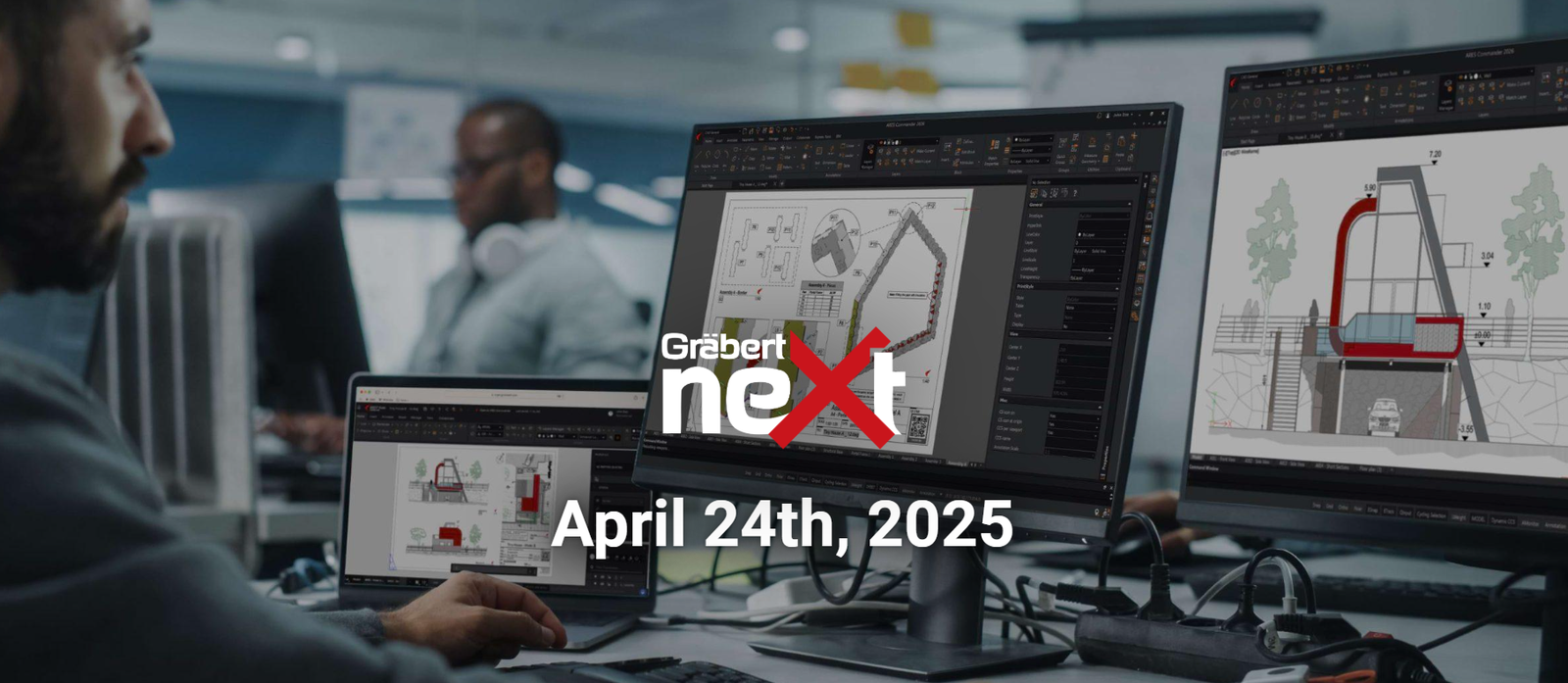Your Cart is Empty
Customer Testimonials
-
"Great customer service. The folks at Novedge were super helpful in navigating a somewhat complicated order including software upgrades and serial numbers in various stages of inactivity. They were friendly and helpful throughout the process.."
Ruben Ruckmark
"Quick & very helpful. We have been using Novedge for years and are very happy with their quick service when we need to make a purchase and excellent support resolving any issues."
Will Woodson
"Scott is the best. He reminds me about subscriptions dates, guides me in the correct direction for updates. He always responds promptly to me. He is literally the reason I continue to work with Novedge and will do so in the future."
Edward Mchugh
"Calvin Lok is “the man”. After my purchase of Sketchup 2021, he called me and provided step-by-step instructions to ease me through difficulties I was having with the setup of my new software."
Mike Borzage
How to Succeed in Architecture: Land a Job after Architecture School
September 05, 2013 9 min read
In June, we started a series of Hangouts on Air for architects, called How to Succeed in Architecture. Each monthly episode features three experts who share their knowledge and answer your questions about a given topic. So far we have broadcast three episodes: Land a Job after Architecture School, Start Your Own Business, and Design for a Cause. Our next episode is scheduled for Tuesday September 10, at 11 am. You can register here to watch it live and submit your questions. The topic? Let's Talk About Money.
Because each episode is so jam packed with information, I will post the times each question is asked here on our blog, with a summary of the answers from our panelists, so you can go straight to the part you care about the most.
Let's start with the first episode of How to Succeed in Architecture: Land a Job after Architecture School.
You can skip the first minute of this episode, as we were still figuring out a few technical things. We didn't figure out the blinking slides issue until Episode 2, my apologies!
00:55 I introduce Novedge.
01:54 Each speaker introduces him/herself: Nancy Goldenberg goes first, followed by Phebe Schenker and Matt Bowles.
04:10 What is the reality of working at an architectural firm? Nancy talks about how, as a student, she expected to design all the time, but the reality is that you have to write a lot, do research and deal with people. Phoebe adds that being an architect is a much more collaborative job than one would expect and you need to have good communication skills. Matt mentions communication and organization skills.
06:00 When looking for a job after graduation, how targeted should a job applicant be in her search? Matt says that in this tough job market, unless you have a strong preference for a specific work environment, you should apply everywhere. Often, you might not even know what you like until you try it. Nancy disagrees and thinks it's important to apply to a firm that specializes in the type of architectural work you want to do. If you can show that you have done some course work or project similar to what they do, that will give you an advantage.
08:18 "Choose your boss, not your job." Do you agree? Phoebe says that it's very important to like the people you work with, not just your boss. Nancy also mentions that it's important to find a mentor, either where you work or outside.
09:22 How do you present yourself to possible employers? Let's start with the portfolio. Phoebe says that your portfolio should be a carefully curated collection of your work that showcases your strengths and lots of different skills. Beautiful images are important and so is the thinking behind it. Nancy suggests having two versions of your portfolio: a short, digital one to send with your resume' and a long one to physically bring to the interview.
11:15 Is there a portfolio that really stood out to you and you still remember? Phoebe is the only one that remembers some and it's because of the "wrong" reasons! Content is more important than "packaging". Nancy replies that presentation is important and gives some tips on how to improve it.
12:28 How important is the resumé? Do you recommend having a printed copy? Or do you just go read it on LinkedIn? Nancy says the resumé is important, and it needs a cover letter. Architects need to be able to write well, so the cover letter ends up being your writing sample. Phoebe agrees and further suggests to write a cover letter that's specific to the firm you are applying to. Err on the side of formality. And make sure to spell people's names right! Matt also recommends to highlight the software you know how to use and eliminate all the information that's not relevant. And keep the resumé to one page.
15:50: Matt, how did you prepare to apply for a job? Matt shares that he first contacted EHDD through school, with a basic resumé and did much better at his interview. After his internship, he worked a lot more on his resumé and blasted it to all the architects he could think of. Eventually EHDD hired him. He recommends keeping everything updated.
11:37 Phoebe, did you interview Matt for a job at EHDD? Phoebe shares that she interviewed Matt for the internship position he ended up getting.
18:23 If your dream firm is not hiring, how should you approach employment possibilities with that firm? Phoebe suggests requesting an informational interview. Relationships are very important. Also, try to meet people who work at that firm, take them out to lunch. If people know who you are, you are more likely to be called in when an opportunity arises. Nancy points out how Matt is the perfect example of this. I add that it is better to build a relationship before you need the job. Nancy reminds people to get another job somewhere else, while waiting for a chance to join the firm of your dreams. It might even help you get more experience and be a better candidate for the job you want.
21:18: How important is social media for job candidates? Nancy says that she never looks at a job candidate's social media presence. Phoebe reminds everyone that if social media is done right, it can only help you, but the opposite is also true. Showing that you understand and can use social media right can show that you are technologically savvy. Matt recommends LinkedIn, saying it was very helpful. Face to face contact is more important, though. Phoebe suggests following the firms you are interested in on social media, to keep up with them.
24:15 How do you network in-person? Nancy suggests starting from a local AIA chapter and to join committees if possible. Phoebe adds that volunteering is also a great way to meet people. Don't be afraid to reach out for mentors. Most people she knows are very interested in mentoring the next generation. Nancy suggests reaching out to your school's alumni association.
26:38: What about international students who studied in the US who are now looking for a job? Phoebe says at EHDD they can give internships to international students and they also have international employees. It's up to the employee to know the process and to make it as easy as possible for the employer. The bigger the firm, the more likely the process will already be in place. Nancy shares her experience in hiring someone from Germany using a 3rd party agency.
29:50: What are you thoughts on receiving resumes from people relocating from other states? Nancy is totally open to it, so is Phoebe. Video interviews are better than phone or Skype calls, in person is the best.
31:45 Besides a Master in Architecture, what other accreditations do employers look for? Phoebe says EHDD prefers people who are LEED certified. Anything that sets you apart is good. Nancy reminds us that it's important to have certifications that are relevant to your specific gig.
34:30 What software is considered most desirable now and in the future to work in an architectural firm? Phoebe says that if you are at an entry level position, the more software you know how to use, the better. EHDD is a Revit based firm and they train their employees. If you are better at Revit than another candidate, that will help you get a job. Matt shares that he knew many programs, especially Rhino. He wasn't that good at Revit, but learned while at EHDD. Revit is a good program to know. Phoebe says they have found that schools are not very good at teaching it, so in some cases EHDD prefers to train people themselves. Nancy says they use mostly AutoCAD, but they are starting to use Revit.
38:15: What are some questions we should be prepared to answer in an interview? Phoebe encourages job seekers to do lots of research on the firm they are interviewing with and to ask questions. Nancy usually asks why people are interested in architecture. Phoebe asks applicants how they enjoy school in order to gage their attitude and work ethic. Matt was asked to describe projects in his portfolio and the software he used to create them. Phoebe also asks about previous work experience and suggests having a "diplomatic" response for that. Don't just say "it sucked!".
41:05 What do you value most in a portfolio from a recent graduate? How much weight do you give to academic projects? Phoebe thinks academic projects are really important. Nancy adds that the longer you have been out of school, the more important it is to show your professional work.
42:50 When hiring a new graduate, would you rather see more study abroad experience or work experience? Phoebe says that it's hard to say without seeing the specific experience. She thinks it's an asset to show you have been out of the country, but also that work experience is very important, as employers don't want to be the first to take you on. At EHDD, they take interns during school more easily because it's for a limited time only, so don't wait to long to get that first job experience. Nancy adds that if your goal is to get a job as quickly as possible, go for an internship. However, in the long run, for your personal and professional development, go for the experience abroad. Matt says that it's hard to get entry level jobs without an entry level job before that! Matt encourages everybody to apply to entry level jobs, even without any prior experience.
45:50 The word "internship" is used in different ways in architecture. Can you talk about the different types of internships out there? Phoebe says that it's really confusing, especially since IDP, The Internship Development Program has co opted the term. The word internship means something very specific in regards to licensing. At EHDD the internship program refers to a program for students while in school. Nancy's firm offers internships to students and also an internship program to get licensed. Both Nancy and Phoebe say that they always pay their interns. The only unpaid internships are offered to students for school credit and they will take those interns along to clients' meetings, etc. so that they can learn more. According to the AIA's Code of Ethics, you cannot not pay interns, unless they are receiving school credit.
48:08 What do you wish was taught in school that would help graduates get a job? Nancy says teamwork is very important. Also, writing and people's skills in general. Phoebe agrees and emphasizes the need to learn good verbal and written communication skills.
50:15 Matt, what do you have to add as a recent graduate, about your experience in school? Matt wishes he could have taken an :"architecture business practices" course: a course to learn how to talk to someone over the phone whom you've never spoken to before or how to send out a set of drawing, how to coordinate a group of consultants, etc. Phoebe emphasizes that it's important to be honest about what you don't know and to be eager to learn and ask questions. It's important to have a personality that is open and honest. Nancy also says that a person's attitude is more important than skills, because people can always learn new skills, but it's harder to change someone's attitude. She also adds that while it's important to learn all the practical skills, it's also important to follow your passion and take some electives while in school. In her case, she took some electives in art history and this made her more employable in her field. Phoebe agrees and also advises taking time off between your undergraduate and graduate degrees.
55:00 What are the automatic turn offs for employers? Phoebe says that for her grammar and spelling are very important. She suggests asking other people to proof read your portfolio, etc. She also doesn't like when people are too informal. Nancy adds that everything should be really concise. A three page resumé and a huge portfolio are really not necessary. It shows that the applicant is unable to edit and that's a big turn off. Also, don't dress too casually for the interview, and don't show up chewing gum, etc. Phoebe suggests to always think from the point of view of the interviewer. Matt says that respecting their time is important, by, for example, sending a link to your portfolio online, so people don't have to download it, resulting in saving them time.
58:30 Any last word of advice? Nancy says to have patience, don't get discouraged. Work on your skills, do volunteer work related to the field and keep at it. Phoebe agrees with that and Matt encourages people to be determined and to take initiative. Make sure to follow up and to talk to everybody. Remember, it's who you know.
1:00:38 Thanks and closing credits.
I hope you find this a useful summary! There were some humorous moments which cannot be conveyed in writing, so take some time to watch the show.
Links:
Novedge on Google+ Add us to your circles to keep up with all future Hangouts on Air
Upcoming Hangout – How to Succeed in Architecture: Let's Talk About Money
Related articles
Also in NOVEDGE Blog

Enhance Your Designs with VisualARQ 3: Effortless Geometry Extensions for Walls and Columns
April 30, 2025 8 min read
Read More
MecSoft Unveils RhinoCAM 2025 and VisualCAD/CAM 2025 with Enhanced Features
March 08, 2025 5 min read
Read MoreSubscribe
Sign up to get the latest on sales, new releases and more …




